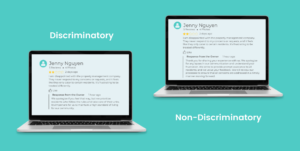In the digital age, responding to customer reviews has become a crucial aspect of businesses’ engagement with their clients and reputation management. This holds true for various industries, including property management. Review responses are essential to the property management industry as they allow businesses to engage with customers, address concerns, and manage their reputation, ultimately fostering trust and attracting potential tenants or clients. However, as essential as it is for property managers to respond to reviews, it is imperative for businesses to recognize the potential ramifications and unintended effects their responses may have under the purview of the Fair Housing Act (FHA).
The Fair Housing Act (FHA) was enacted in 1968 as a direct response to widespread housing discrimination prevalent at the time, particularly against marginalized groups such as racial minorities. It was a landmark legislation that aimed to ensure equal housing opportunities for all individuals by prohibiting discrimination based on race, color, religion, sex, national origin, familial status, and disability. It applies to various aspects of the housing industry, including advertising, sales, rentals, and financing. Its goal is to ensure that everyone has equal access to housing opportunities, free from discriminatory practices. While the FHA was established to address discrimination, its application to responses made in online reviews introduces intricate challenges surrounding inadvertent bias and how they may be perceived.
Following an online review, companies have the opportunity to respond, addressing concerns or expressing gratitude for positive feedback. However, what companies often fail to realize is there is a fine line between appropriate engagement and potential discrimination. Property managers must exercise caution when crafting responses to avoid any inadvertent violation of the FHA.
First, it is important to recognize how FHA violations occur. Unintentional discrimination is often a result of a company, in its response to a review, unknowingly including language or undertones that could be perceived as discriminatory. Even if a company did not intend to discriminate, the perception of discrimination by the reviewer or other readers can still harm the business’s reputation and potentially lead to legal repercussions.
Perception plays a significant role in determining whether a response to a review is considered discriminatory or not. The FHA recognizes that discrimination can be subtle and unintentional, focusing on the effect it has on protected classes rather than the intention behind the actions. Therefore, businesses need to be aware of the potential impact their words may have and take steps to ensure they avoid language or behavior that may be seen as discriminatory.
To minimize the risk of unintentional discrimination, businesses can adopt the following best practices:
- Treat all reviewers equally: Respond to reviews in a consistent and fair manner, regardless of the reviewer’s protected status.
- Focus on the issue raised: Address the concerns or questions raised in the review without making assumptions based on the reviewer’s protected characteristics.
- Avoid stereotypes and generalizations: Refrain from using language or making statements that could be perceived as stereotyping or perpetuating bias.
- Train employees: Provide training to employees who respond to reviews, ensuring they are aware of fair housing laws and guidelines for non-discriminatory communication.
- Seek legal guidance if uncertain: If there is uncertainty about the appropriateness of a response, consult legal counsel to ensure compliance with fair housing laws.
For example, the following are review could be perceived as discriminatory and non-discriminatory: 
Review: “I am disappointed with the property management company. They never respond to my concerns or requests, and it feels like they only cater to certain residents. It’s frustrating to be treated differently.”
Potentially Discriminatory Response : “We apologize if you feel that way, but we prioritize residents who follow the rules and take care of their units. It’s important for us to maintain a high standard of living for our community.”
Explanation: The response suggests that the property management company caters to certain residents based on their behavior, which could imply a discriminatory preference or bias. It may unintentionally create an impression of unequal treatment and reinforce stereotypes or assumptions.
Non-Discriminatory Response: “Thank you for sharing your experience with us. We apologize for any lapses in our communication and understand your frustration. We strive to provide prompt assistance to all residents, and we value your feedback. We will review our processes to ensure that all concerns are addressed in a timely manner moving forward.”
Explanation: This response acknowledges the resident’s concerns without making any assumptions or discriminating statements. It shows empathy, takes responsibility for any shortcomings, and expresses a commitment to improving communication and responsiveness for all residents. The focus is on addressing the specific issue raised and demonstrating a proactive approach to resolving the matter.
The Fair Housing Act seeks to eliminate discrimination in housing, and this extends to the digital landscape where online review responses can inadvertently perpetuate bias. While property managers should engage with customers and respond to reviews, it is crucial to exercise caution to avoid unintentional discrimination and negative perceptions. By adopting best practices, companies can promote inclusivity, protect their reputation, and ensure compliance with fair housing laws.


